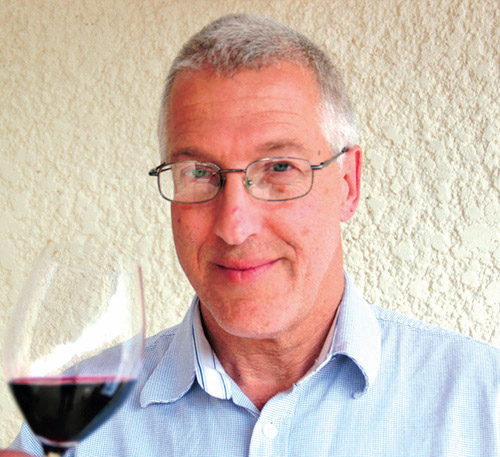




It was a unique evening. I should have known when I made arrangements to invite winemaker Lewis Pasco to taste his own wines with my Jewish Link tasting group, that this iconoclastic, loquacious chef/winemaker/oenophile/oleh would have something to say. I just wish I’d brought a sweater as our social distanced, pandemic-era wine tastings are held outside and that evening I was reminded with a jolt that fall is here, and winter is coming!
Pasco has a unique background and approach to winemaking; his buoyant, fruit-forward red wines don’t communicate even half of his detailed, almost scientific perspective. His skill is honed to precise details such as the number of days required to press a certain varietal, with consideration put in for Shabbat or Yom Tov, because if you can’t stop the maceration process on a given day, an entire vat, or more, can be ruined.
Pasco’s story has been featured in this paper before. Growing up in Tenafly and bar mitzvahed at Ahavath Torah in Englewood, he worked initially as a chef in San Francisco. But he “inherited his mother’s discerning palate,” and eventually felt constrained by the fine dining industry’s punishing schedule. He was bitten by the wine bug in California, eventually doing a master’s at UC Davis’s vaunted viticulture program.
Following his mother’s deathbed request that he “marry a Jewish girl,” Pasco arrived in Israel, Davis degree in hand, in 1997. He interviewed at Dalton but was referred instead to Tishbi Winery, as Dalton’s winemaker position had just been filled. Pasco spent his first three vintages in Israel making wine at Tishbi, including buying new, higher-quality oak barrels, overseeing a barrel room redesign with Jonathan Tishbi and acquiring and managing an increasingly higher quality of equipment, then switched to Recanati. (“Rockefeller is to Long Island what Recanati is to Israel,” Pasco said, explaining that Recanati is a well-funded venture.) During his time at both Tishbi and Recanati, both wineries took their first major medals, which they continue to receive to this day.
After marrying Irit, having two daughters and coming back to the states to ensure they’d get bilingual educations, the family moved back to Israel later on so Pasco could work as a consulting winemaker. Pasco’s younger daughter is shortly to begin her IDF service.
Initially, Pasco made wine for Hillel and Nina Manne at Beit El Winery. Pasco told Jewish Link contributor Gamliel Kronemer several years ago that the arrangement was an amazing opportunity. “In the winter of 2011, the Mannes presented Pasco with a unique offer: ‘We can’t afford you as a [consulting] winemaker…but if you will come and live with us in our home in Beit El, and take over our vintage in 2012, we’ll make wine for you, free of charge.’ It was an offer that Pasco decided he could not pass up,” Kronemer wrote.
The Mannes also gave Pasco four tons of grapes for his wine, to which he added an additional seven tons of grapes that he sourced from area vineyards. This resulted in the production of 8,000 bottles of a Bordeaux-style blend that Pasco named the Pasco Project #1. Pasco recalls that “as it evolved, it dawned on me that I’m not working for somebody else now, I’m working for me…[and] it’s my project.” By 2017, Pasco was also consulting winemaker for Bin Nun Winery, located near the Beit El Winery in the Judean Hills. He continues to make Pasco wines as well, reveling in Israel’s unique terroir, and the development of Israel as a truly beautiful winemaking country.
We had the pleasure of tasting four Pasco-made wines during our evening together.
The first was the Beit El Majestique Reserve Cabernet Sauvignon 2014, courtesy of Greg Raykher’s personal stash (Thanks Greg!), which was warm, velvety and smooth. It had an herbal nose, and Pasco explained that this is a result of shading the grapes and keeping green elements in the vineyard. The wine is aged for 20 months in new French oak. I remembered trying this wine in 2018 and recalled vaguely that it was great but not quite ready to drink. Now it is, and it’s delicious.
We tried two wines from the very new Bin Nun Winery, which opened just a year before the last Shmittah year. First we tried the Bin Nun Cabernet Sauvignon/Merlot Reserve 2017. Comprising 37% cabernet sauvignon and 63% merlot, it was aged for 10 months in high-quality French oak. Pasco explained that Bin Nun was Israel’s “first legal estate winery with its own vineyards,” located over the green line in the foothills of the Judean Hills. Also herby, this deep, lush red wine has some cigar box on the nose and finish, and is very satisfying.
Next we tried the Bin Nun Cuvee 2018, which was a real treat and very much in the Pasco style of bold, oaky and chewy. This wine comprises 55% merlot, 40% cabernet sauvignon and 5% petite verdot. It was our sense that this is a unique, special wine that is only now getting ready for drinking, but will be fully bloomed after two or three more years of bottle aging.
The last bottle we tried was the 2018 Lewis Pasco Project Box BDX. The breakdown of this wine was 51% cabernet sauvignon, 34% merlot, 6% cabernet franc, 5% petit verdot and 4% petite syrah. The is a vibrant, fruit-forward wine, heavy with a nose of herbs but really easy to drink. There is a sense of fresh green tobacco here as well. Overall, this is a lovely red blend that can be cellared or drunk now. Or both!
The bottom line? If you like red wine, any label with Lewis Pasco’s name on it will not disappoint.










